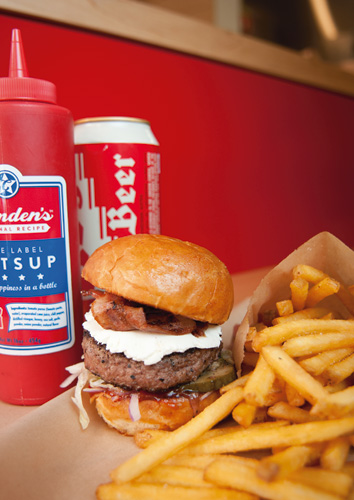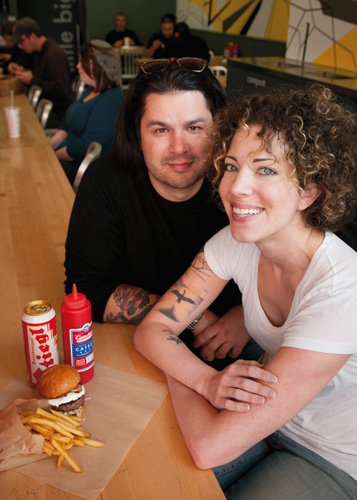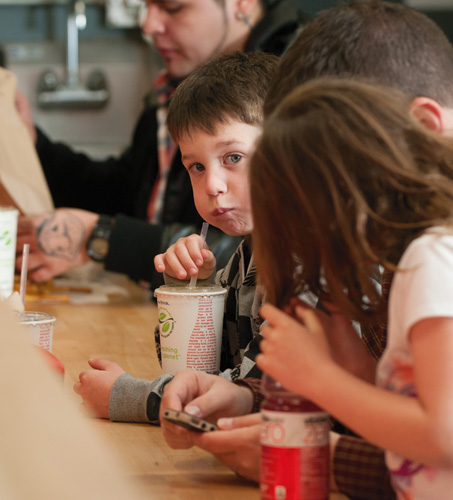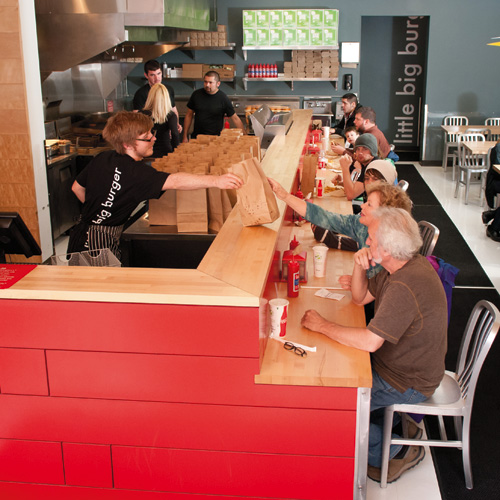 Good burger joints aren’t rare, but Little Big Burger in Portland stands out for its big profits and rapid expansion.
Good burger joints aren’t rare, but Little Big Burger in Portland stands out for its big profits and rapid expansion.
BY LUCY BURNINGHAM
 |
Photo by Matthew Ginn |
Inside any Little Big Burger restaurant, linear murals in red, yellow and white splash across the walls as hip-hop music pounds with a bumping beat. The colors should look familiar; they’ve been co-opted by almost every fast-food chain for precisely the same reasons they’ve been chosen here. The hues make humans act rashly, impulsively and hungrily.
Go ahead, order. The menus at each of the four locations have just six items. The fries ($2.75) are spritzed with diluted truffle oil, and the burger ($3.25) comes with a beef patty that is thick but shrunken in diameter (the inspiration for the restaurant’s name). Top the burger with one of three Oregon-made cheeses, but don’t count on many more permutations. If you have a hankering for a salad or milkshake, for example, you’re in the wrong place.
Four to five employees work at any Little Big Burger at any given time. Minimal prep work for the limited menu means employees arrive just two hours before opening and leave one hour after closing.
Their efficiency has been carefully crafted. At the flagship Little Big Burger in Portland’s Pearl District, employees once formed burger patties by hand. But the extra time wasn’t worth the inconsistent patty sizes; now the burgers are preformed by SP Provisions, of Portland, the restaurant’s supplier of Cascade Natural Beef.
Every food item is served in a brown paper bag, which makes you feel like you should take your food to go. Should you? Owners Micah Camden and Katie Poppe hope so. Or at least they want you to eat quickly and leave.
That’s because Little Big Burger’s owners, business partners who are engaged to marry in August, unabashedly admit they’re selling fast food, a strangely shocking admission in Portland’s restaurant community.
In a town where organics, local-food sourcing, farm dinners, nose-to-tail butchering and chef/owners drive the popularity of many restaurants, those establishments frequently struggle to garner reliable profits. Not Little Big Burger.
Without a doubt, Camden, 33, and Poppe, 32, have inspired industry envy. “I feel like Charlie in Willy Wonka and the Chocolate Factory,” Camden says. “I’ve got the golden ticket. I’m just waving it around.”
While a glut of burger joints have popped up in Oregon in the past few years, only Little Big Burger was founded by Camden, a provocative personality who made a name for himself by opening four small-footprint restaurants in North Portland within just three years. While Poppe is the quieter, lesser-known partner, she’s proven invaluable for execution and follow-through.
Still, to most people, these are Camden’s joints.
“The kid really thought through everything in a tactical way and called Portland’s bluff,” says Kurt Huffman, owner of ChefStable Group, a Portland investment firm that develops and funds local restaurants. “It’s super smart in a way most Portland restaurateurs would have been ashamed to do.”
For example, the Little Big Burger model doesn’t go to the lengths of Foster Burger, a ChefStable restaurant, which serves hand-cut fries, as well as house-made pickles and brioche buns. “We have all these high and mighty elitist ideas about what Portlanders want, but at the end of the day, people just want a good burger that tastes like the burger they want,” Huffman says. “In the food industry, we tend to get caught up in our own ambitions instead of making food the way people want it to be made.”
It’s not that Camden and Poppe have entirely eschewed the Portland ethos. “What we do has Portland flair,” says Camden, who speaks in rapid-fire sentences that make him seem as brash as he is captivating. “You have to use great ingredients in this town.” For example, Little Big Burger serves locally made buns that do not contain corn syrup; fries made from Yukon Gold potatoes; and ketchup from Camden’s own recipe. Everything is served in compostable goods.
 |
Little Big Burger owners Micah Camden and Katie Poppe have inspired industry envy with the success of their burger chain. Since the first location opened almost two years ago in Portland, they have opened two more locations in Portland and one in Eugene, and they have two more in the works.// Photo by Matthew Ginn |
Even without eyeballing the books, Huffman and other restaurateurs know Little Big Burger is doing something right. Since the first location opened in September 2010, Camden and Poppe have opened two more locations in Portland — in the high-foot-traffic zones of Mississippi Avenue and Division Street — and one in Eugene. All locations have footprints of less than 1,500 square feet and lack drive-throughs or parking lots.
Camden and Poppe have two more locations in the works, in the South Waterfront district and on Northwest 23rd Street, which will add 20-plus jobs to the existing 40.
“We saw a gap,” Poppe says. “There are typical low-quality, cheap fast-food burgers and then a jump to higher-quality, expensive bistro burgers. There were very few providers of inexpensive, gourmet fast-food burgers.”
Similar models include Laughing Planet Cafe, Hot Lips Pizza and, on a larger scale, Burgerville and Chipotle Mexican Grill.
Joe Rapport, one of the owners of Joe’s Burgers of JoPa Hospitality Group in Portland, is in the process of opening a fourth Joe’s Burgers in the city. (The first location was a kiosk in Bridgeport Village.) While Joe’s burgers have thinner patties and can be topped with meat chili and American cheese, the model resembles Little Big Burger: a simple menu with some locally sourced ingredients.
“In the last few years, the pattern has shifted,” Rapport says. “People going out want to spend less per person.” He mentions his now-defunct restaurant 50 Plates as an example of what wasn’t working. “I had a restaurant in the Pearl that had great food and a good reputation, but not a lot of people were coming in the door.”
Joe’s Burger has been such a hit that Rapport turned his Northwest Grill, a midrange sit-down restaurant in Raleigh Hills that had been in business for nine and a half years, into one of the burger joints.
Profit margins for quick-service restaurants usually garner more than the 10% restaurateurs expect to make from upscale restaurants. But Rapport says 15% to 20% profits are “where everybody really wants to settle. If people are doing better than that, then God bless them.”
The four Little Big Burger locations average between 35%-40% profit margin, say its owners. “It was unexpected,” Poppe says. “I wrote the business plan with a conservative 20%,” Camden says. “We doubled it.”
Even without Little Big Burger-size profit margins, burgers are a reliable restaurant concept, says Scott Hume, who is editor of BurgerBusiness.com, which covers the burger industry nationwide.
“Burgers are not a trendy food; they’re a staple food,” Hume says. “In bad times you can sell $4 burgers, and in boom times you can sell $14 burgers.” The Chicago-based NPD Group recently reported that while the total number of restaurants in the U.S. declined between the fall of 2010 and the fall of 2011, the number of quick-service burger operations, both independent and chains, rose slightly.
The Portland area has followed the trend beyond Little Big Burger and Joe’s Burger, with places such as Killer Burger and Dick’s Kitchen, and new outcroppings of national chains such as Five Guys Burgers and Fries, and Boardwalk Fresh Burgers and Fries. But Little Big Burger stands out for its rapid expansion and huge profits, the result of a certain kind of mastermind.
 |
Quality ingredients and a limited menu define the LBB strategy.// Photo by Matthew Ginn |
When the first Little Big Burger opened in 2011, Micah Camden had already made a name for himself in Portland. Camden, a high school dropout from Salt Lake City, arrived in Portland in 2005 from Hawaii. He started working as a prep cook at P.F. Chang’s and eventually landed a job as chef at 750 ml, a now-defunct wine bar in the Pearl District.
Camden likes to talk about these types of triumphant events, such as when he explains how, at age 16, he told one of his high school teachers he was already trumping a teacher’s salary by running a yard-care business. It’s easy to imagine that, even back then, Camden spoke as though he had something to prove.
In Portland Camden stayed on as chef when 750 ml became a Cobras and Matadors restaurant (also defunct), where he met Dayna McErlean, who lives in the second level of a North Portland building she owns. McErlean says Camden implied he was the owner of the restaurant, so she mentioned how she hoped to develop the first-floor space of her building. Camden had ideas. “After 40 minutes in the space, he came up with the name and concept for Yakuza,” she remembers.
She provided all the capital for Yakuza, which opened in 2006, and Camden was part owner and chef. “He was the idea guy who put in a lot of sweat equity,” McErlean says. The sleek Japanese-inspired restaurant featured an award-winning burger.
During the next two years, Camden opened two more restaurants. McErlean loaned him the money to open Beast, a communal-table prix fixe restaurant next door to Yakuza, which Camden opened with chef Naomi Pomeroy (she bought Camden out entirely in November 2009 and has been the sole owner of the restaurant since). Then he and McErlean opened DOC, another small-footprint restaurant, this time with an Italian menu, located a block north of the other restaurants just off Killingsworth Street.
“There were plenty of times he worked without pay,” McErlean says. “He was committed to making the restaurants a success. But he wasn’t always up front, and at times it was difficult to be partners with him.”
When talking about his work history, Camden says he’s never worked for anyone else. “Except when you were learning to cook,” Poppe counters.
The restaurants received plenty of local and national press, with Camden as the face of the empire. “They were calling it Camden’s corner,” he says.
“We thought it was appropriate for him to be the face of the restaurants,” McErlean says. “But many people still don’t realize he hasn’t been involved in the restaurants for two years.”
In the summer of 2009, the height of the recession, Camden launched another restaurant in the compound: Fats, an English-style pub with a burger on the menu. He received $30,000 in startup funds from Portland investor Clint Elliott, the only investor Camden says he’s worked with during his restaurant career. Elliott eventually filed a lawsuit against Camden after the restaurant shuttered in the fall of 2010.
The lawsuit claimed that Camden neglected Fats and developed the Little Big Burger chain without Elliott, even after they’d been discussing opening a quick-service burger place together. Elliott says the case settled for $20,000 — $5,000 less than his attorney’s fees.
Camden describes the “Camden’s corner” period as a time of 90-hour workweeks devoid of the kind of profits he’d envisioned from restaurant ownership. “I was a cult of personality,” he says. “But the money wasn’t there.”
He says he got the idea for a “little big burger” during a street fair that celebrated Yakuza’s anniversary, for which he made free burger sliders.
In the summer of 2009, he approached Poppe at the bar at Yakuza; he was working, and she was a regular who lived in the neighborhood. They started dating and eventually decided to pool $80,000 to open the first Little Big Burger, sans investors. (The building’s landlord contributed $60,000 in tenant improvements.)
“I put all the savings I had left in the world into it, which was very nerve racking,” says Poppe, who has a bachelor of science in psychology from Portland State University, where she also pursued an MBA. Poppe was attending the Art Institute of Portland when she met Camden. “But it paid off because now I’m entirely debt free. We use the cash flow from one restaurant to build out the next.”
 |
The flagship Little Big Burger was opened in Portland’s Pearl District in September 2010. “We saw a gap,” says Poppe.// Photo by Matthew Ginn |
The investment produced quick results: The Pearl District location broke even in three months, the couple says. Poppe pressed Camden to open more locations; Camden admits he’s prone to moving on to new, unrelated projects.
“One of us is the creative idea factory and one of us is the reality check,” says Poppe, who speaks quietly and calls herself a “hard-core introvert.”
“I’m the food systems setup guy,” Camden says. “I come up with ideas and try to bring them to life.”
Even with new Little Big Burgers in development, Camden says he couldn’t resist launching a new project. In May he and Poppe opened Boxer Sushi, a restaurant on SE Hawthorne Boulevard manned by a former Yakuza chef, to tepid reviews. Just as Poppe tempers the idea machine, helping manage and execute details, she may have also been instrumental in subtly helping shift Camden to become more of a behind-the-scenes restaurant owner.
“Personal identities are attached to people, and people are human and make human mistakes,” she says. “If they hear the one littlest bit of gossip and it’s spun out of proportion, and somebody is cast in a bad light, that could take the whole business down.”
Even so, she says it’s been frustrating being the less-identified business partner, especially in the press. “Everybody wants to be recognized and appreciated,” she says.
The couple says they’re planning to be behind-the-scenes owners on another project: Camden’s Catsup, which is currently served only in Little Big Burgers. As the next phase of an ambitious 10-year plan, the duo plans to supply Northwest stores and restaurants with Camden’s Catsup. “I want a NASCAR running around the Daytona 500 with ‘Camden’s’ on it,” he explains, a scenario in which the ketchup would rival Heinz and Hunt’s.
As evidence of his commitment to the condiment, Camden has tattoos of an onion, tomato, some honey and a whisk on his arm. (The rest of the ingredients are pending an appointment with some ink.)
Right now 30,000 bottles of the ketchup are sitting in the warehouse of a California tomato-processing plant, where the recipe was executed on a large scale, as the couple sets up distribution channels.
In a more realized future, Camden and Poppe say they plan to sell the Little Big Burger concept in about five years, after they’ve established a record of consistent profits. While they’ve tinkered with the possibility of expanding outside Oregon, they now plan to keep all restaurants in state.
“Every restaurateur wants to have a shot doing something like that,” Kurt Huffman says. “You put all the things you know about business into a package, grow it and see if you can’t sell it.”
In the meantime, as Camden talks about opening a Chinese restaurant, the ultimate success of Little Big Burger may hinge on the execution of the smart, existing model. Even the idea man understands that reality.
“Hey,” says Camden to an employee who’s sweeping the floor at the Division Street Little Big Burger. “We have a vacuum and it works great. Use it.”
Lucy Burningham is a Portland journalist who has written about craft distilleries, food carts and the natural foods industry for Oregon Business. She can be reached at [email protected].

